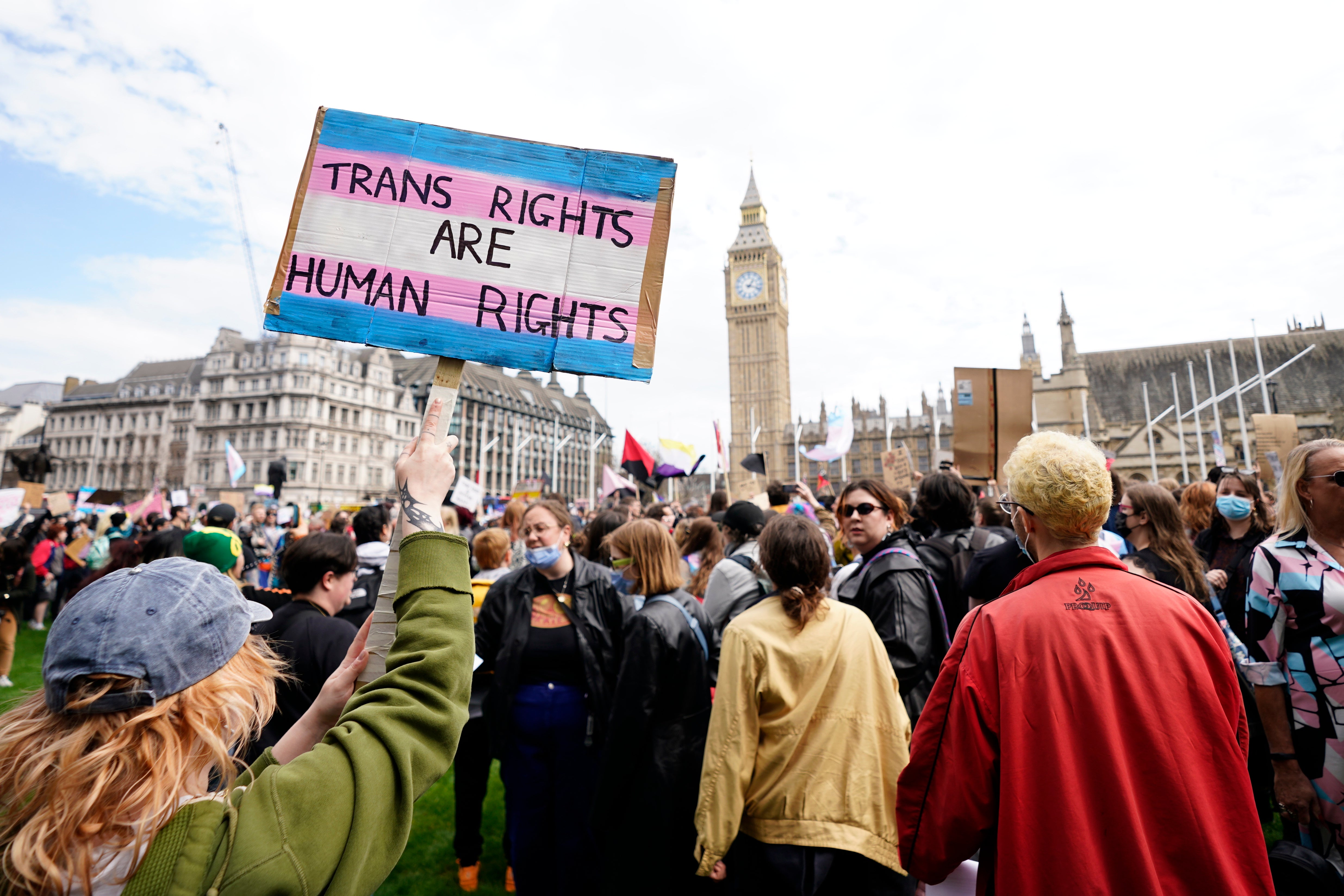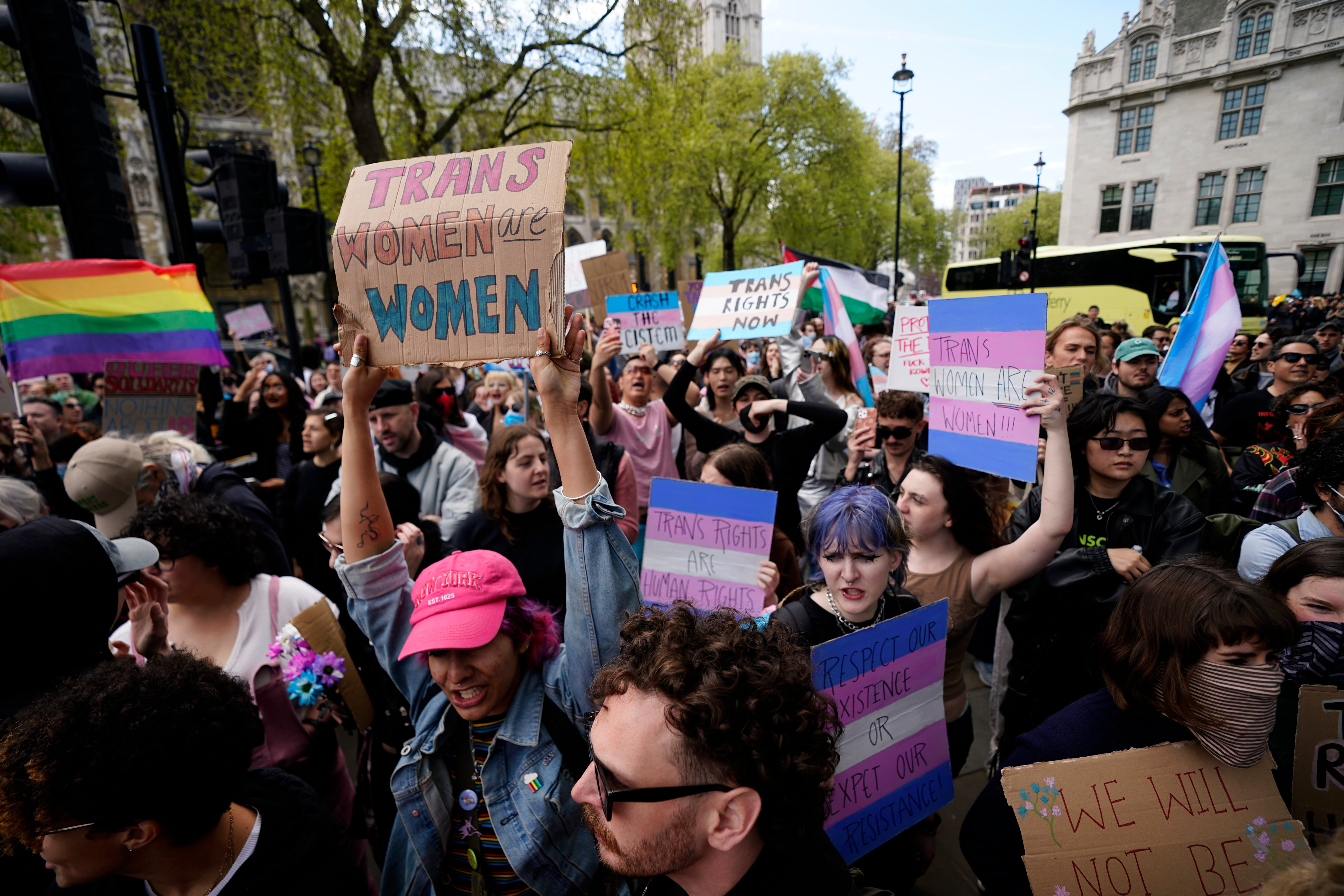ARTICLE AD BOX
Trans rights campaigners have warned that misinformation spreading through the community is fuelling fear and confusion, a month on from the Supreme Court’s ruling on the legal definition of a woman under the Equality Act.
Support and advocacy groups have said “weaponised misunderstandings” about the practical consequences of the ruling – such as whether trans women can still legally use women’s toilets and other spaces – have caused panic among some trans people.
They said some trans women have reported feeling nervous about using women’s toilets in public spaces out of fear of being arrested, despite the ruling not having created criminal law.
jane fae, director of campaign group TransActual and chair of Trans Media Watch, said: “It’s fair to say trans people are afraid they’ll be arrested if they go in [women’s] spaces, because there are people who are afraid of that. It is creating panic.
“Any person saying now saying if you go in that space you’ll be arrested, is talking nonsense. There is no crime.
“But [trans people] are self-limiting because they are scared.”
.jpeg)
Joanne Lockwood, a 60-year-old trans woman, believes there has been a “weaponised misunderstanding” of the ruling by gender critical groups, which has aided misinformation being spread about it.
She said that even though she had been using women’s toilets for many years, the ruling had made her question whether she should continue to do so. She also cancelled her gym membership as she was unsure how her gym would respond.
“Nobody wants to be embarrassed going to the toilet, and nobody wants to be embarrassed going to the gym,” she said. “I ended up cancelling my gym membership because I couldn’t be bothered to have the conversation.
“It affects your mental health, it affects how you perceive your rights. Nobody wants to be seen as a threat or somebody who is trespassing in someone else’s space.”
Lui Asquith, a solicitor at law firm Russell-Cooke, which represented Amnesty International UK in these proceedings, told The Independent that the Supreme Court did not rule that a trans person would be acting “illegally” if they accessed a women-only space.
They said: “The fact that this question is even being asked reflects the way this judgment is being communicated to the general public.
“The judgment deals with the rules around possible discrimination by service providers; particularly, when they can rely on the exception which permits discrimination by service providers on the basis of the ‘sex’ protected characteristic in certain, limited circumstances.”

They added: “The Equality Act is mainly enforced in employment tribunals and the civil (not the criminal) courts – the Equality Act does not involve criminal law, which the state enforces by prosecution in the criminal courts.
“The confusion may lie in the fact that there are forms of harassment that are dealt with as criminal offences, but that isn’t what this judgment was dealing with.”
Steph Richards, CEO of leading UK trans rights group TransLucent, told The Independent misinformation around the meaning of the ruling had left some people “deeply distressed” and “frightened”, adding: “There are people who have just been going to their work, lots of people don’t even look at the news these days because frankly its quite miserable.
“So I think there’s been a degree of shock, and because it has been so misinformed that this is a criminal issue when it’s not - it’s a civil issue - there have been concerns.”
However, guidance from bodies such as the Equality and Human Rights Commission (EHRC) has stated that trans women “should not be permitted to use the women’s facilities” in workplaces or public-facing services such as shops and hospitals.
The equalities watchdog has been threatened with legal action since the guidance was published, with lawyers acting on behalf of TransLucent sending a letter warning it “incorrectly states the legal position” of the court ruling.

After the ruling, former Supreme Court judge Jonathan Sumption warned that organisations were potentially misinterpreting the landmark ruling, telling BBC Radio 4’s PM programme that, contrary to much of the commentary, judges did not take a side and did not provide an obligation to create single-sex spaces.
Asquith said the judgment does not oblige services to exclude trans people, and that there was “a risk that service providers respond hastily without fully understanding the judgment and the Equality Act, undermining access to services for trans people”.
They added: “As the justices repeated, trans people (whether or not they have a gender recognition certificate) continue to be protected by the Equality Act and service providers must be able to justify their exclusion from services as proportionate and legitimate.”
Jo Maugham, executive director of the Good Law Project, said the group had seen an increase in trans or gender non-conforming women being confronted.
“Anecdotally, we can see a rise in violence against gender non-conforming women, be they cis or trans,” he said, adding he had seen reports of multiple women being challenged for using a toilet.
“I would describe the EHRC statement as misinformation, which has had a very profound negative effect on the lives of, in particular, gender non-conforming women.”

A spokesperson for the EHRC told The Independent: “At the EHRC we uphold and enforce the Equality Act. Our response to the Supreme Court’s judgment has been, and will continue to be, firmly grounded in the law. Those who rely on us are reassured that every explanation of equality law from the EHRC will be accurate and authoritative. That is our job, as Britain’s independent and expert equality regulator.
“We know there is uncertainty among duty-bearers and affected groups. The EHRC has been visible in providing clarity on the consequences of the judgment and will continue to be so.
“We will shortly launch a consultation on the detailed draft updates made to our statutory Code of Practice for service providers, public bodies and associations, following the Supreme Court judgment. It is important that our code is both an accurate interpretation of the law and clear to those who use it. We want to hear affected stakeholders’ views on the clarity of these updates. So we urge interested parties to respond to the consultation when it is launched. We will consider every response carefully and amend the draft where necessary following the consultation.
“The EHRC is wholeheartedly committed to upholding everyone’s rights and tackling discrimination in all its forms.”

.jpeg?trim=0,0,0,0&width=1200&height=800&crop=1200:800)







 English (US) ·
English (US) ·